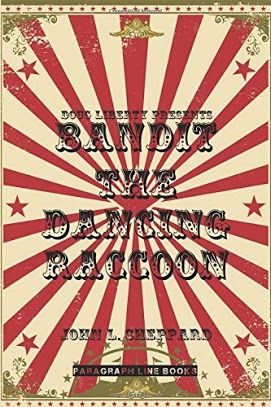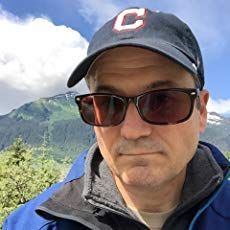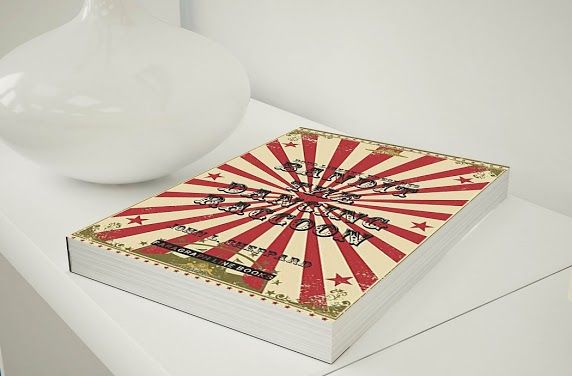
Humor
Published: November 2018
Publisher: Paragraph Line Books
Effete alcoholic Tris Edgar finds a talking raccoon digging through his trash one evening. Tris tells a story of heartbreak, loss and self-defeat, and of his life as an instant celebrity in the internet age. At turns dark and whimsical, Doug Liberty Presents Bandit the Dancing Raccoon is a uncanny fable for the 21st century.
Praise for Doug Liberty Presents Bandit the Dancing Raccoon:
"Sheppard is a hugely imaginative writer, deftly balancing humor, pathos and lyricism." -Self-Publishing Review
Excerpt
When I went to work the next night, Delores wasn’t there. She was supposed to be there. She left behind a note on the back of an order pad that said she was returning to Zanesville, Ohio, and that I shouldn’t follow her because nothing good could come from my following her to Zanesville. She’d double-underlined and capitalized Zanesville in each instance of its use in the note. She helpfully wrote down the address for what she said was her parents’ place in Zanesville at the bottom of the note.
This is how people get in trouble, you know. Not following directions.
It was an adventure. I took the note, left the restaurant, locked the doors and shoved my key under the front mat. I could have tried to drive my car to Zanesville, but it wouldn’t have made it.
I didn’t have much money. I’m not very good with money. This is a problem of mine going way back. All the way back. And all the way forward, too, to the present day. Ask the raccoon, if you can find him. He didn’t appreciate my situation.
I walked down to the Trailways bus station with the intention of buying a ticket to Zanesville, or maybe Cincinnati or Cleveland. I was unsure concerning the geography part of the adventure. Ohio was north. I knew that much.
At the bus station, a dude wearing a white, bellbottomed jumpsuit with “FATTU” spelled out in golden sequins sparkling on his back and sequined flames sewn into the seams from his armpits to his white ankle boots, hired me to ride shotgun with him from Florida to Ohio. I found him pacing around the bus station near the coin-operated TV sets. I’d been on my way to the ticket counter. I expected him to speak in an Elvis-inspired drawl, but he didn’t. His voice was Midwestern flat. There was no musicality to it whatsoever. He spoke quickly, too. “You want to go to Ohio? Let’s do this. Here’s two hundred dollars.” He handed me $300 in twenties. I counted it in front of him and tried to give back the extra hundred. “You keep it! You keep it! Good job! You’re trustworthy. We have a circle of trust going.”
I was wearing my work uniform. We were quite a pair walking out of the bus station to his waiting car, a mid-1970’s Camaro painted gold, like the car in the Rockford Files, glowing under a streetlight. Or was it a Pontiac Firebird? The engine was running. I could see blue smoke rising out of the tailpipe and up into the humid air. It was the rainy season. Everything was wet—ground, trees, people, air. I flung my straw boater onto a palmetto bush growing at the edge of the lot.
Where did I leave my car? Should I have sold my car? It wasn’t worth the effort to think about the car, so I didn’t.
He produced an glass amber bottle of black beauties. The bottle had been around since the 1970’s, like his car. Maybe he’d found it under the bucket seat. I popped a tablet, he popped four. He told me he was going to dictate his novel to me, and I was going to type it all down. He handed me an Olivetti in a brown leatherette zipped case and a roll of paper from a paper towel dispenser. “This is going to be my masterpiece. Type it all down! I’m the new Kerouac!” The speed made me feel like there were invisible live wires under my skin. I kept shouting, “Woop! Woop!” I typed the guy’s masterpiece while he drove. He had an organist’s keyboard built into the dash, and he played it. Bach fugues, mostly, to accompany his dictated writing. There were pipes in the doors. Every note vibrated through them.
“Her lips were pillows for my psionic mind.” I remember that line. I don’t remember a lot of the rest of it. Most of it was like that, though.
All the roadsigns that I’d read from my annual trips north were still there somehow (Stuckey’s, See Rock City, etc.).
I typed, and the paper kept getting stuck. The ribbon was on its last legs. The paper tore, so I ripped it and tossed it in the seat behind me. I looked back at some point and there were all these curls of typed-upon paper back there.
“Is it done?” he asked me, riffing on the keyboard. “Is it done? Is it done?”
“Yes,” I told him. “It’s done.”
“Cool,” he said, and drove us off the side of a low bridge in Kentucky, bounding over rocks ten feet down before sloshing nose first into the river below.
“I should have asked for more money,” I muttered as the car splashed down.
“What’s that?!” he shouted.
“Never mind.”
We somehow survived. I rolled down the window, climbed out of the car, swam ashore and looked back. The car was gone. So was the author.
About the Author

John L. Sheppard, a graduate of the MFA@FLA creative writing program at the University of Florida, is a native of Cleveland, Ohio. He lives in Illinois. He wrote a series of books about the adventures of Audrey Novak.
Contact Links
Purchase Links
Don't forget to check out our Facebook, Twitter, Instagram, and out other social media found on the side bar!
Did you know that comments are DELICIOUS? Well they are and if you comment on any of these posts you could win some awesome goodies!
Disclaimer: "All opinions are 100% honest and my own." Thanks to Goodreads and Amazon for the book cover, about the book, and author information. Buying via these links allows my site to get a % of the sale at no cost to you.
FTC Guidelines: In accordance with FTC guidelines regarding endorsements and testimonials for bloggers, I would like my readers to know that many of the books I review are provided to me for free by the publisher or author of the book in exchange for an honest review. If am compensated for any reviews on this site I will state that post has been sponsored.
FTC Guidelines: In accordance with FTC guidelines regarding endorsements and testimonials for bloggers, I would like my readers to know that many of the books I review are provided to me for free by the publisher or author of the book in exchange for an honest review. If am compensated for any reviews on this site I will state that post has been sponsored.













1 comments:
Thanks for hosting
Post a Comment
Hateful and Unrelated Comments Will Be Deleted. Anonymous comments are invalid to enter into giveaways.